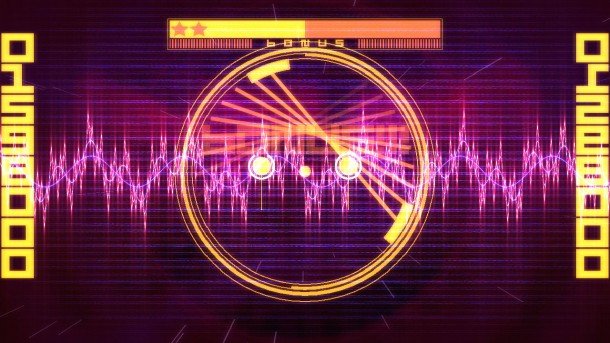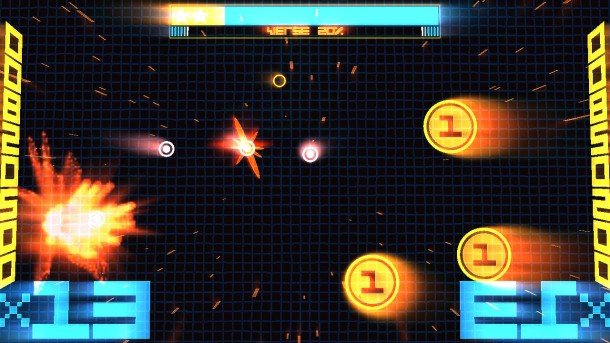Dropchord preview — Double Fine's finger-controlled game demonstrates impressive tech

The experimenters at Double Fine have a new invention called Dropchord , a simple arcade game which has players control two points along a circle's circumference. The points are connected by a cord used to intersect point-scoring orbs which trigger verses in electronic music tracks. It's madly colorful and expressive, with positive feedback similar to that in Geometry Wars, but it's unsurprising until you get to the central problem: how do you control two points on the screen with one mouse?
You don't. Dropchord is a launch game for the incoming Leap Motion controller, which tracks your fingers and palms in 3D space in front of your monitor.
The device is a small rectangular box which sits on your desk. In the debug program, colored dots pinpointed each of my finger tips and two planes displayed the rotation of my palms. It may only track hands, but it realizes one-to-one motion control far better than Kinect. With my index finger, I could accurately trace tiny circles on the screen as if there were an invisible tablet in front of me.
In Dropchord, your two index fingers are tied to the two points on the circle. As you move them, the cord connecting them shrinks and grows, and the challenge is how to snag points while avoiding the paths of red baddies. It worked well when Senior Gameplay Programmer Patrick Hackett demonstrated, but I had trouble keeping the virtual knot tied to my left finger. That could have been my inexperience with keeping my limbs within Leap Motion's invisible tracking box, or an issue with the setup—we had the device on a low coffee table instead of the expected desktop setting.
When it did work, it felt like black magic. My computer is not supposed to know precisely where my fingers are! Dropchord itself is charming—I especially enjoyed the free-form bonus stages, largely for the driving electronic beats—but I actually enjoyed experimenting with Leap Motion's debug tool even more, tracing colorful streamers across the screen with my fingers.
I'm fascinated by the device's potential, and how Double Fine and other devs may make use of it in the future. Imagine wearing an Oculus Rift VR headset, reaching your hand out in a game like Amnesia, and seeing it rendered in front of you as you gently pull open a door. Oh man.

Double Fine's first experiment with the device will appear on Leap Motion's app store when it launches on July 22nd. It may not become the fabled "killer app" every new bit of tech supposedly needs, but it's a good demonstration of its features, and a show of support for progress in human/computer interaction.
The biggest gaming news, reviews and hardware deals
Keep up to date with the most important stories and the best deals, as picked by the PC Gamer team.
After decades of mice and keyboards, the way we interact with computers is now rapidly mutating. Some ideas have fizzled, but others—like the iPad—have turned out to be things we never even knew we wanted. I'm excited to find out if Leap Motion turns out to be one of those things.

Tyler grew up in Silicon Valley during the '80s and '90s, playing games like Zork and Arkanoid on early PCs. He was later captivated by Myst, SimCity, Civilization, Command & Conquer, all the shooters they call "boomer shooters" now, and PS1 classic Bushido Blade (that's right: he had Bleem!). Tyler joined PC Gamer in 2011, and today he's focused on the site's news coverage. His hobbies include amateur boxing and adding to his 1,200-plus hours in Rocket League.

